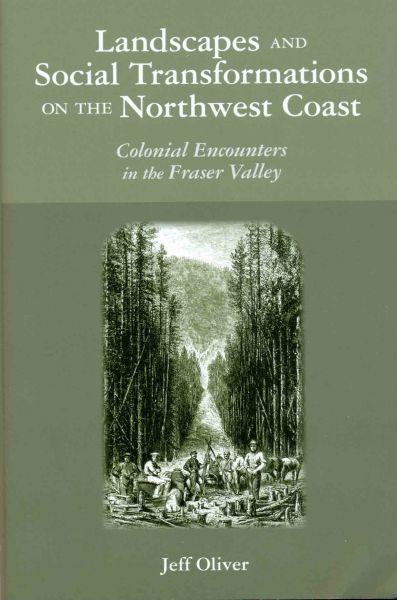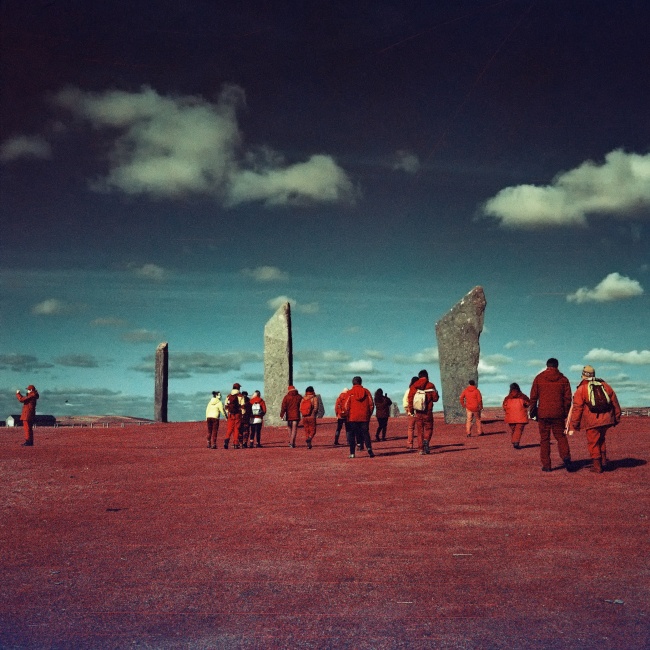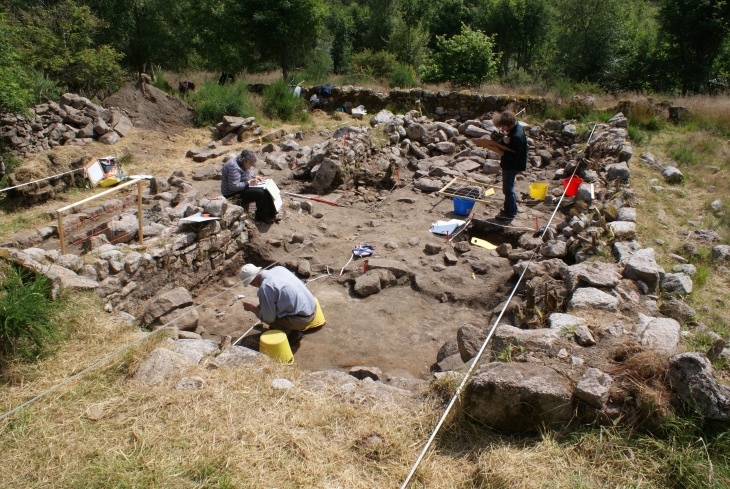
BA (Simon Fraser) MA, PhD (Sheffield), FSAScot
Reader
- About
-
- Email Address
- j.oliver@abdn.ac.uk
- Telephone Number
- +44 (0)1224 273191
- Office Address
Department of Archaeology
School of Geosciences
University of Aberdeen
St. Mary’s, Elphinstone Road
Aberdeen, AB24 3UF
Scotland, UK.
- School/Department
- School of Geosciences
Biography
Jeff is a landscape archaeologist with an interest in the recent and contemporary past. His research has focused mainly on the colonial period of western Canada and improvement-period Britain. Within this context his work addresses issues such as cultural interaction, questions around social grouping, historiography and interdisciplinarity. He is currently involved in two projects. The first focuses on colonial settlement in the Canadian prairies where he is examining intercultural relations among migrant peoples. The second is investigating the archaeology of crofting at the Bennachie Colony in rural Aberdeenshire. The latter project includes a significant element of community engagement, which to date has encouraged a range of public events across the Northeast of Scotland.
Originally from the west coast of Canada, Jeff studied archaeology and history at Simon Fraser University (BA 1998). He worked as a consulting archaeologist in coastal and interior British Columbia before relocating to Sheffield in the United Kingdom where he read towards an MA in Landscape Archaeology (2001) and a PhD in Archaeology (2006), both under Mark Edmonds. Jeff joined the Department of Archaeology at Aberdeen in 2008 and was promoted to the position of Senior Lecturer in 2013. In addition to teaching, fieldwork and writing for the department, he is an Honorary Curatorial Fellow at the University Museums and Vice Chair of the Aberdeen and North-East Section of the Society of Antiquaries of Scotland.
Qualifications
- BA Archaeology with History1998 - Simon Fraser University
- MA Landscape Archaeology2001 - University of Sheffield
- PhD Archaeology2006 - University of Sheffield
Memberships and Affiliations
- Internal Memberships
-
Head of Department
Member of the School of Geosciences Executive Committee
- External Memberships
-
UKRI: Future Leaders Fellowships Peer Review College Member
Editorial Board: Contemporary and Historical Archaeology, a new specialist sub series from BAR Publishing edited by William Caraher (North Dakota) and Rachael Kiddey (Oxford).
Latest Publications
The archaeology of whin mills in post-medieval northeast Scotland
Proceedings of the Society of Antiquaries of Scotland, pp. 259-285Contributions to Journals: ArticlesExploring the effects of post-medieval crofting on the modern hillside ecosystem: Vegetation history as cultural legacy
Cultural Landscapes of North-east Scotland: Collaborative Research in History and Archaeology. Shepherd, C. (ed.). Oxbow Books, pp. 147-159, 14 pagesChapters in Books, Reports and Conference Proceedings: Chapters (Peer-Reviewed)Land for the Landless: squatting and encroachment in the uplands
Cultural Landscapes of North-east Scotland: Collaborative Research in History and Archaeology. Shepherd, C. (ed.). Oxbow Books, pp. 131-146, 16 pagesChapters in Books, Reports and Conference Proceedings: Chapters (Peer-Reviewed)Landscape Legacies of the Landless
Places JournalContributions to Specialist Publications: ArticlesColonial diary for historical context.: Review of Reading the Diaries of Henry Trent: The Everyday Life of a Canadian Englishman, 1842-1898 by J. I. Little
The British Columbia ReviewContributions to Journals: Reviews of Books, Films and Articles
- Research
-
Research Overview
Periods and Regional Interests
- Northwest Coast of North America: prehistory, colonial history
- Western Canada, 18th century to present day
- Britain, particularly later historic and contemporary
Themes
- Contact and colonial archaeology and history
- Interdisciplinary approaches to landscape
- Material culture studies
- The politics of heritage
- Archaeological resource management
Current Research
Colonial Landscapes on the Northwest Coast of North America: My doctoral research investigated the social history of the Fraser Valley, Western Canada, from "pre-contact" to the unsettling and sometimes violent upheavals of nineteenth and early twentieth century colonialism. Drawing on a diverse range of artefacts - from material culture and ethnographic texts to cartography and historical writing - this project traced the contours of landscape transformations and the way that changes in the land were implicated in constructing different perceptions of history, identity and place among Natives and newcomers. In 2010 I published Landscapes and Social Transformations on the Northwest Coast (University of Arizona Press); the first book-length treatment of colonial landscape transformations for coastal British Columbia. Continuing research in this area combines a focus on material culture and landscape with an examination of the history of cultural contact. Because this period witnessed dramatic and yet asymmetric social and cultural change, it provides fertile ground in which to explore the varied ways that interaction affected the development of both indigenous and incoming societies and how this was resolved in different parts of the coast.

Reviews of Landscapes and Social Transformations:
“This book is well grounded theoretically and provides a nuanced view of social constructions of the landscape, from everyday traversing and working of the land to mythic and diagrammatic constructions and legal and verbal discourses.” —Crisca Bierwert, author of Brushed by Cedar, Living by the River: Coast Salish Figures of Power
“Landscapes and Social Transformations is a highly intelligent and important monograph deserving of much praise. Oliver possesses the rare gifts of eloquence and economy of words, which enable him to produce, for all its conceptual complexity and temporal coverage, a book of just over 200 pages of text. More impressive, however, is the thoughtful and deft manner with which he takes the familiar tropes and more recent revisionist nuances of colonial history and complicates them with his ground level engagement with the Fraser Valley.”—BC Studies
“Oliver’s approach to historical scholarship -- one that highlights the ambiguity of colonial relationships – is valuable in advancing how scholars understand and produce colonial discourse. His ability to integrate disciplinary and temporally diverse publications on natural resources and cultural knowledge about the Fraser Valley results in solid scholarship and provides compelling data to advance his theoretical positions.”—Arizona Anthropologist
“Since the days of Franz Boas, the Northwest Coast has been on the cutting edge of colonial knowledge of Indigenous peoples and places—for better and for worse. Written in a very different time, Oliver’s book nonetheless continues that trend while demonstrating respect for Stó:lo presence in territory, a good awareness of the legacies of colonialism, and an incisive grasp of diverse scholarly practices. As such, it is a model for scholarly environmental history that takes Indigenous history seriously.”—Environmental History
“Oliver’s text provides a refreshing and well-grounded perspective on the complex nature of First Nations and European settler relations in the late 18th through the early 20th centuries. This book will be of considerable interest and use to archaeologists, anthropologists, historians, and others interested in the history of the Fraser Valley, British Columbia, the greater Northwest region, or contexts of colonialism and encounter more generally.”—Canadian Journal of Archaeology
“Landscapes and Social Transformations on the Northwest Coast, [is] a generously textured account of indigenous and colonial relationships, intercultural exchange, and settlement in coastal British Columbia.”—Ethnohistory
“This clever book defies disciplinary classification, engaging history, archaeology, geography, Native, and environmental studies. It is a thoughtful and useful contribution to the wider post-colonial literature and our understanding of an important region.”—Pacific Historical Review
“His deceptively simple arguments neither praise nor vilify the historical participants he identifies. Ultimately he succeeds in providing an ambiguous and messy picture.”—Pacific Northwest Quarterly
“In what is the text’s most elegant content, Oliver works at multiple scales, draws upon diverse archives and materials, and navigates different historical periods to expand understandings about the Fraser Valley.”—Journal of Historical GeographyEuropean migrant landscapes and intercultural relations in western Canada: Between 2012 and 2016 I was PI on a project working with Dr Ágústa Edwald investigating European migrant landscapes in western Canada during the late nineteenth and early twentieth century. This period witnessed the emergence of a new cultural patchwork and presents significant opportunities to explore the consequences of intercultural relations. What were the effects of living adjacent to culturally 'other' neighbours? Influenced by historical conditions such as the creation of migrant block settlements and a legacy of multiculturalism, historiography in this part of the world tends to orient our understanding of the cultural landscape in terms of what might be refered to as ‘identity history’. One of our principal observations is that that by focusing on relationships rather than boundaries, it is possible to locate spaces of sharing and communities of practice that cut across the fault lines of ethnic belonging. The broad brushstrokes of these ideas have been published in the journal Cultural Geographies. Future research in this area continues to examine the delicate interplay between people, material culture and landscapes, and in particular how local conditions, at different historical moments, helped to either separate people or to bring them together.
The Bennachie Landscape Project: Community Connections in the North-East of Scotland: A collaborative venture between the Bailies of Bennachie and the University of Aberdeen, this project focuses on past and present community relationships with land, resources and society in one of north-east Scotland's most celebrated landscapes: the hill of Bennachie and its environs. Previous research has demonstrated a wealth of multi-period archaeological remains, from a Pictish power centre to a nineteenth century crofting community, however, surprisingly little archaeological and historical research has been undertaken, presenting a unique opportunity to put historical communities into their landscape context. At the same time, contemporary community groups have a strong interest in managing and developing opportunities in this historic environment and so a second major plank of this research focuses on engaging local people to create a long-term sustainable strategy for community involvement.
Initial research has focused on the archaeology and history of the ‘Colony’ settlement – celebrated in the north-east for having been a site of tension between nineteenth-century crofter-colonists and neighbouring landowners. Our current work is focusing on various community agencies operating on the hill, how these changed over time and how they were linked to events and processes beyond the settlement. As the Colony provides a fascinating window on local-scale, micro-historical processes, our research serves to push beyond currently available generalized histories of 19th-century rural life. Our first interpretive statement on this topic was recently published in the International Journal of Historical Archaeology. Ongoing work at Bennachie is providing a platform to involve and develop future interests among the local community. In doing so, we expect to be taken in new and unexplored research directions.
Funding and Grants
2022-25 The historical Ecology of Lowland Hillscapes: Assessing the Impact of Post-Medieval Settlement Colonisation on Relationships between Humans, Animals, and Plants. QUADRAT Doctoral Studentship to Louise Smith.
2017-18 Enacting the Past: Stories from the Colony to the Tatras. AHRC Follow-on Funding for Impact (Co-Investigator with PI Elizabeth Curtis and Co-Investigators).
2013-14 Bennachie Landscapes: Investigating Communities Past and Present at the Colony Site. AHRC Research Development Grant (PI with Co-Is: Gordon Noble, Rick Knecht, Karen Milek, Jo Vergunst, Elizabeth Curtis, Neil Curtis, Jackson Armstrong, Marjory Harper, Siobhan Convery, James Schofield).
2013-14 Sharing All Our Stories Scotland. AHRC Follow On Funding (Co-I with PI Elizabeth Curtis and Co-Investigators).
2012-16 European migrant landscapes and intercultural relations in western Canada Leverhulme Trust Project Grant (PI).
2012-13 Sustainable Community Heritage in Scotland's North-East: Bennachie and Beyond. AHRC Connected Communities Grant. Co-Investigator with PI Gordon Noble, and Co-Is Rick Knecht, Jo Vergunst, Elizabeth Curtis, Jackson Armstrong, Doreen Coyle, Peter Stollery and Ken Skeldon).
2012 Archaeological Theory and the Indigenization of Canada's Past. Grant to support participation in a session at the Canadian Archaeology Association conference, Montreal. Principal's Excellence Fund.
2011-12: Native-lived colonialism and culture change on Canada's west coast: A comparative approach. Carnegie Trust Grant.
- Teaching
-
Teaching Responsibilities
I teach on the following undergraduate courses: AY1003 Archaeology in Action: An Introduction; AY1503 Caves to Kingdom; AY2505 Archaeology of the North: Lifeways and Culture Change; AY2508 Archaeology of Social Life; AY3009 Scottish Archaeology; AY4510 Current Issues in Archaeology. I also teach on the following postgraduate courses: AY5001 Northern Worlds; AY5002 Theory and Method in Research; AY5501 Northern Peoples and Cultures; AY5502 Advanced Archaeological Approaches in Northern Research.
Course Co-ordinator:
AY3504 Archaeologies of Landscape
Landscapes may be quantitative or qualitative; they can be explored with scientific instruments, using our bodies or through our imaginations. This course investigates the concept of landscape and its relationship to archaeological research across a broad range of cultural and historical contexts. The course is organized around thematic lectures and culminates in an interactive 3-day study trip to the Orkney Isles where we think through the ways in which Neolithic, Medieval and twentith-century archaeology can be placed in a landscape context. The trip not only helps students to hone their interpretive tool kit, but is an excellent way to meet new and interesting people.

The Stones of Stennes. Photo: Sean McHale
AY3521 Historical Archaeology
What can archaeology tell us about the lives of people who lived in times and places dominated by written records? Contrary to popular perception, 'history' is not all in the books! Historical Archaeology provides us with an alternative means of studying historical people, periods and places through the things that people left behind. If historians study historic documents to shed light on the past, historical archaeologists use artefacts and information from the natural environment to do this. Students who take this course will learn how the approaches of historical archaeology can be applied to some of the most significant issues to have shaped the medieval and modern periods; from diet and disease to social status and gender; and from the rise of kingdoms and nation states to capitalism and globalisation.
Hillside excavation, the Colony, Bennachie Landscapes Project. Photo: J. Oliver
Current Research Students
- Louise Smith - The historical ecology of lowland hillscapes: assessing the impact of post-medieval settlement colonisation on relationships between humans, animals, and plants
-
Greg Michaelson - The representation of prehistory in Punch cartoons
-
Alistair Stenhouse - The landscape of Improvement in Easter Ross, 1700 to 1850
Former Research Students
-
Chris Martin - An object-biographical investigation of the Northwest Coast American collections at the Perth Museum and Art Gallery (PhD 2020).
-
John Barrett - An assessment of medieval town planning in Northeast Scotland (MSc by research 2019).
-
Michael Stratigos - The lost lochs: a reassessment of crannogs in Scotland (PhD 2018).
-
John H. Goodlad - The Shetland cod fishery from 1811 to 1909 (PhD 2014).
-
Michael Bumstead - The Use and Impact of Canadian Beaver on Britain, 1750 - 1850 (PhD 2014).
-
Ágústa Edwald - From Iceland to New Iceland: An Archaeology of Migration, Continuity and Change in the late 19th and early 20th Centuries (PhD 2012).
- Publications
-
Page 1 of 5 Results 1 to 10 of 46
The archaeology of whin mills in post-medieval northeast Scotland
Proceedings of the Society of Antiquaries of Scotland, pp. 259-285Contributions to Journals: ArticlesExploring the effects of post-medieval crofting on the modern hillside ecosystem: Vegetation history as cultural legacy
Cultural Landscapes of North-east Scotland: Collaborative Research in History and Archaeology. Shepherd, C. (ed.). Oxbow Books, pp. 147-159, 14 pagesChapters in Books, Reports and Conference Proceedings: Chapters (Peer-Reviewed)Land for the Landless: squatting and encroachment in the uplands
Cultural Landscapes of North-east Scotland: Collaborative Research in History and Archaeology. Shepherd, C. (ed.). Oxbow Books, pp. 131-146, 16 pagesChapters in Books, Reports and Conference Proceedings: Chapters (Peer-Reviewed)Landscape Legacies of the Landless
Places JournalContributions to Specialist Publications: ArticlesColonial diary for historical context.: Review of Reading the Diaries of Henry Trent: The Everyday Life of a Canadian Englishman, 1842-1898 by J. I. Little
The British Columbia ReviewContributions to Journals: Reviews of Books, Films and ArticlesWhat's in a name? Review of Canada's Place Names & How to Change Them by Lauren Beck
The British Columbia Review, 1910Contributions to Journals: Reviews of Books, Films and ArticlesExploring Co-production in Community Heritage Research: Reflections from the Bennachie Landscapes Project
Journal of Community Archaeology & Heritage, vol. 9, no. 3, pp. 196-215Contributions to Journals: ArticlesReview of The Archaeology of Burning Man. The Rise and Fall of Black Rock City by Carolyn L. White
Norwegian Archaeological Review, vol. 55, no. 2, pp. 188-191Contributions to Journals: Reviews of Books, Films and Articles- [ONLINE] DOI: https://doi.org/10.1080/00293652.2022.2076609
Indigenous Knowledge, Archaeological Thought, and the Emerging Identity Crisis
Decolonizing "Prehistory": Deep Time and Indigenous Knowledges in North America. Mackenthun, G., Mucher, C. (eds.). University of Arizona Press, 27 pagesChapters in Books, Reports and Conference Proceedings: Chapters (Peer-Reviewed)Expert Opinion in the Matter of Kwikwetlam First Nation Claim
Commissioned by Kwikwetlam First Nation. 47 pagesBooks and Reports: Commissioned Reports

